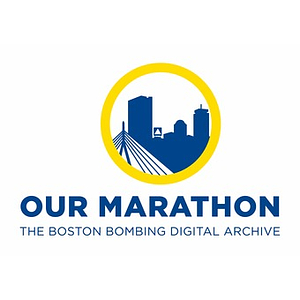WBUR Oral History Project: Dr. David King. Clip 2
Item Information
- Title:
- WBUR Oral History Project: Dr. David King. Clip 2
- Description:
-
Countless lives were affected by the 2013 Boston Marathon bombings and their aftermath. The WBUR Oral History Project collects stories from individuals whose lives were immediately and irrevocably changed by these events. Thanks to the generous sponsorship of WBUR, our team of oral historians, and the participation of these interview subjects, Our Marathon has tried to ensure that these stories are not forgotten. We believe that these stories matter, and that they demonstrate the ways historical events transform the lives of the people who lived through them. Oral historians Jayne K. Guberman, Ph.D., and Joanna Shea O'Brien conducted the interviews for this project. Oral History Project Manager Kristi Girdharry, Our Marathon Project Co-Director Jim McGrath, and Community Outreach Lead Joanne DeCaro recorded the interviews and provided research assistance and post-interview processing. McGrath and Our Marathon Audio Technician Ryan McDonough provided sound editing and processing for all of the interviews and clips. The opinions and statements expressed in interviews and related content featured in the WBUR Oral History Project do not necessarily reflect the opinions of Our Marathon, WBUR, Northeastern University, or any employees or volunteers affiliated with these institutions and projects. Our Marathon and The WBUR Oral History project make no assertions about the veracity of statements made by participants in this project. Dr. David King is a trauma and acute care surgeon at Massachusetts General Hospital. During his medical residency, he joined the US Army and was subsequently deployed as a front line doctor in Iraq (2008) and Afghanistan (2011). Now a lieutenant colonial in the US Army Reserves, David continues to be interested in many aspects of acute care and mass casualty rapid response. David is an avid runner and triathlete who has participated in some forty to fifty marathons over the past twelve years, including four previous Boston Marathons. On Marathon Day, he was focused on finishing in 3 hours and 15 minutes, the qualifying time for his age group. After crossing the finish line, he was in a cab heading home with his family when he started receiving strange messages asking if he were okay, including one that mentioned an explosion. Unable to access his web browser, he decided to have his wife take him directly into the hospital. Walking into the trauma center at the Mass General emergency room, he immediately saw a pattern of injuries among the five to six patients already there that he knew must be the result of an improvised explosive device. Within three minutes of arrival, he was taking a patient to operating room. Over the ensuing hours and days, David worked tirelessly with his team to stabilize and operate on the most acutely injured survivors, many of whom required multiple surgeries, including amputations. During this initial period of acute care, he also interacted with family members and escorted President Obama, when he came to comfort survivors on the Thursday following the bombings. In his interview, David talks about lessons learned on the battlefields in Iraq and Afghanistan that have become well integrated into acute care of patients suffering traumatic injuries here at home. He discusses the emergency response systems in place at Mass General, as well as the coordination among Boston-area trauma hospitals that directed ambulances to the various facilities, thereby saving the lives of so many seriously injured patients. Finally, he reflects on the importance of every member of the hospital team, from the surgeon, nurses, and anesthesiologists, to the cafeteria workers and those who clean the operating rooms between surgeries. Everyone, he points out, plays a vital role when the care of grievously injured patients is at stake. In this clip, Dr. King talks about Mass General Hospital and their response to the Boston Marathon bombings. He also describes how a team of people work together to help save a life.
- Interviewee:
- King, David
- Interviewer:
- Guberman, Jayne
- Recordist:
- McGrath, Jim
- Contributor:
- McDonough, Ryan
- Date:
-
February 24, 2014
- Format:
-
Audio recordings (nonmusical)
- Genre:
-
interviews
oral histories (literary genre)
- Location:
- Northeastern University Library
- Collection (local):
-
Our Marathon
- Subjects:
-
Boston Marathon Bombing, Boston, Mass., 2013
- Places:
-
Massachusetts > Suffolk (county) > Boston
- Extent:
- 00:02:15
- Link to Item:
- http://hdl.handle.net/2047/D20267600
- Terms of Use:
-
In Copyright. This Item is protected by copyright and/or related rights. You are free to use this Item in any way that is permitted by the copyright and related rights legislation that applies to your use. For other uses you need to obtain permission from the rights-holder(s). http://rightsstatements.org/vocab/InC/1.0/ Requests for permission to publish material should be addressed to Northeastern University Library's Digital Scholarship Group (dsg@neu.edu).
Contact host institution for more information.
- Language:
-
English
- Notes:
-
The opinions and statements expressed in interviews and related content featured in the WBUR Oral History Project do not necessarily reflect the opinions of Our Marathon, WBUR, Northeastern University, or any employees or volunteers affiliated with these institutions and projects. Our Marathon and The WBUR Oral History project make no assertions about the veracity of statements made by participants in this project.
The WBUR Oral History Project. Dr. David King (Oral History), Jayne Guberman (Oral Historian), Jim McGrath (Recorder), Ryan McDonough (Sound Processing and Editing)




